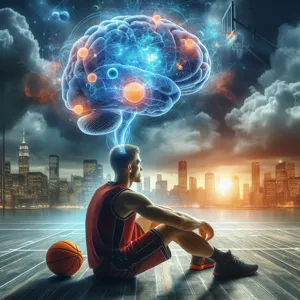Basketball is often celebrated for its fast-paced action, impressive athleticism, and strategic play, but the sport’s true essence lies as much in the mind as it does in physical skill.
Mastering the mental game can be the difference between an average player and an exceptional one. It encompasses everything from building confidence and resilience to maintaining focus and managing pressure during high-stakes moments. In this blog post, we’ll explore essential strategies that can elevate your game beyond mere physical prowess, delving into techniques that help you cultivate a winning mindset. Whether you’re a player looking to enhance your performance on the court or a coach aiming to inspire your team, these insights will provide you with the tools needed to achieve basketball success by harnessing the power of mental fortitude. Join us as we unlock the secrets to mastering the mental game and transforming your approach to basketball!
1. Understanding the Mental Game in Basketball

Basketball is often hailed as a game of physical prowess, agility, and skill, but the mental game is just as crucial, if not more so, in determining a player’s success. Understanding the mental game in basketball involves recognizing that every dribble, pass, and shot is influenced not just by physical abilities but by a player’s mindset, focus, and emotional resilience.
At its core, the mental game encompasses a range of psychological factors including confidence, motivation, and the ability to handle pressure. Successful players understand that their thoughts can either empower them or hinder them on the court. For instance, a player who approaches each game with a positive mindset and unwavering belief in their abilities is far more likely to perform at their peak than someone plagued by self-doubt and fear of failure.
Furthermore, the mental game is about maintaining composure under pressure. Whether it’s a last-second shot in a tightly contested game or a free throw in a crucial moment, the ability to stay calm and focused can make all the difference. This involves not only mental conditioning but also developing routines and strategies to manage anxiety and stress.
Visualization is another key component of mastering the mental game. Many elite athletes use mental imagery to rehearse their performances, envisioning themselves executing plays flawlessly before they step onto the court. This technique helps build muscle memory and prepares the mind for the physical challenges ahead.
Lastly, understanding the mental game also means recognizing the importance of teamwork and communication. Basketball is inherently a team sport, and fostering strong relationships with teammates can help create a cohesive unit that thrives on trust and shared goals. This synergy can elevate individual performances and contribute to overall success.
In sum, mastering the mental game in basketball is about cultivating a strong mindset, developing effective coping strategies, and fostering positive relationships both on and off the court. By prioritizing these mental skills, players can enhance their performance, push through challenges, and ultimately achieve greater success in the game they love.
2. The Importance of Mindset for Performance
In the world of basketball, skill and physical prowess are undoubtedly essential components of success. However, one aspect that often goes overlooked is the critical role of mindset in shaping a player’s performance. The importance of mindset cannot be overstated; it serves as the foundation upon which all physical abilities are built. A strong mental approach not only influences how players handle pressure but also dictates their resilience, focus, and overall enjoyment of the game.
A positive mindset fosters confidence, allowing players to trust their instincts and execute plays without hesitation. When a player believes in their abilities, they are more likely to take calculated risks, make bold moves, and ultimately shine on the court. Conversely, a negative mindset can lead to self-doubt and anxiety, causing even the most skilled athletes to falter during high-stakes moments.
Visualization techniques can be a powerful tool in cultivating a winning mindset. By mentally rehearsing successful plays and visualizing themselves overcoming challenges, players can train their minds to respond positively under pressure. This practice not only enhances confidence but also strengthens neural pathways, making it easier to replicate successful actions during actual games.
Moreover, maintaining a growth mindset is crucial for continuous improvement. This involves embracing challenges, learning from mistakes, and understanding that effort and perseverance are key to development. Players who adopt this mindset view setbacks as opportunities to learn rather than insurmountable obstacles, leading to a greater likelihood of long-term success.
Finally, mindfulness practices, such as meditation and breathing exercises, can greatly enhance a player’s focus and composure. By learning to remain present and manage their emotions, athletes can better navigate the ups and downs of competition, allowing them to perform at their best when it matters most.
In summary, cultivating a strong, positive mindset is just as vital as honing technical skills in basketball. By prioritizing mental preparation and resilience, players can unlock their full potential and elevate their performance on the court.
3. Visualization Techniques for Success

Visualization techniques are powerful tools that can significantly enhance a basketball player’s performance on the court. This mental strategy involves creating vivid mental images of successful plays, movements, and game scenarios, allowing athletes to rehearse and prepare mentally even when they’re not physically practicing.
To begin, find a quiet space where you can relax and focus without distractions. Close your eyes and take a few deep breaths to center yourself. Picture the court—its dimensions, the sound of the sneakers squeaking on the hardwood, the smell of the gym, and the crowd’s energy. Imagine yourself in your jersey, feeling confident and ready to perform. As you visualize, walk through specific situations: making a successful free throw, executing a perfect layup, or defending against a tough opponent.
The key is to engage all your senses in this practice. Feel the ball in your hands, hear the swish of the net as the ball sails through, and visualize the crowd erupting with cheers. Research shows that your brain can’t always differentiate between imagined and real experiences, meaning that consistent visualization can enhance muscle memory and improve actual performance.
Incorporating visualization into your regular training routine can help reduce anxiety and build confidence. Many elite athletes, including professional basketball players, swear by this technique, using it to mentally prepare for high-pressure situations, such as a game-winning shot or a critical defensive play. By making visualization a part of your mental game, you not only prepare your mind for success but also create a winning mentality that translates into better performance on the court.
4. Setting Goals: Short-term vs. Long-term
Setting goals is a fundamental aspect of mastering the mental game in basketball. It provides athletes with a clear vision of what they want to achieve, creating a roadmap that guides their journey toward success. However, not all goals are created equal; understanding the distinction between short-term and long-term goals is crucial for a well-rounded approach to improvement.
**Short-term goals** are the stepping stones that pave the way to achieving larger aspirations. These goals are typically specific, measurable, and attainable within a few weeks or months. For instance, a player might set a short-term goal to improve their free throw percentage by 10% over the next month, or to master a particular dribbling technique before the next game. By focusing on these immediate objectives, players can experience quick wins that build confidence and momentum. Short-term goals also allow for the ability to adapt and make necessary adjustments in training, helping athletes stay motivated as they check off accomplishments along the way.
On the other hand, **long-term goals** represent the bigger picture—where players envision themselves in several months or years. These goals often encompass broader achievements, such as earning a scholarship, making the varsity team, or even becoming a professional athlete. Long-term goals require a sustained commitment and resilience, as progress may not always be linear. It’s essential for athletes to regularly revisit and refine these goals, ensuring they remain relevant and aligned with their evolving aspirations and circumstances.
The key to successfully harnessing the power of goal-setting lies in balancing these two types. Short-term goals act as a series of milestones that lead to the ultimate long-term objectives, providing both direction and motivation. By celebrating small victories while keeping an eye on the larger vision, players can maintain a positive mindset, navigate challenges with greater ease, and truly master the mental game of basketball.
5. Developing Focus and Concentration

In the fast-paced world of basketball, where split-second decisions can mean the difference between victory and defeat, cultivating focus and concentration is paramount. This mental fortitude allows players to tune out distractions, hone in on their objectives, and execute plays with precision. Developing these skills requires more than just physical practice; it involves a deliberate approach to mental conditioning.
One effective strategy is the implementation of mindfulness techniques. By practicing mindfulness, players can learn to remain present during high-pressure situations, reducing anxiety and enhancing performance. Simple exercises, such as deep breathing or visualization, can help athletes center their thoughts before a game or during critical moments on the court. For instance, visualizing successful free throws or game-winning shots can create a mental blueprint that boosts confidence and focus when it counts.
Another essential aspect of concentration is setting specific goals. Athletes should break down their objectives into smaller, manageable tasks—whether it’s improving shooting accuracy, mastering defensive maneuvers, or enhancing teamwork. By concentrating on these incremental goals, players can maintain focus on their development and avoid feeling overwhelmed by the bigger picture.
Additionally, creating a consistent pre-game routine can significantly enhance concentration. This could include warm-up drills, listening to motivating music, or engaging in light stretches—all activities that signal to the mind that it’s time to switch into game mode. A well-structured routine not only helps players mentally prepare but also fosters a sense of familiarity and comfort, helping to alleviate nerves.
Lastly, it’s crucial to minimize distractions during gameplay. Communication with teammates about maintaining focus, along with strategies to avoid overthinking during critical moments, can keep the team aligned and driven. Practicing mindfulness, setting achievable goals, establishing routines, and minimizing distractions are all powerful tools in mastering the mental game of basketball. By sharpening focus and concentration, players can elevate their performance and contribute more effectively to their team’s success.
6. Managing Stress and Anxiety on the Court
Managing stress and anxiety on the court is crucial for any aspiring basketball player looking to elevate their game. The pressure to perform—whether during a high-stakes game or a crucial moment in practice—can be overwhelming. However, mastering your mental state can be the difference between hitting that game-winning shot or succumbing to the weight of the moment.
One effective strategy is to establish a pre-game routine that helps center your focus. This could include deep breathing exercises, positive affirmations, or visualization techniques where you imagine executing your skills flawlessly. By consistently engaging in these practices before each game, you condition your mind to enter a calmer, more focused state when it’s showtime.
Another key element is to embrace the power of mindfulness. Practicing mindfulness means being fully present in the moment, allowing you to tune out distractions and the external pressures that accompany competition. Whether it’s focusing on the feel of the ball in your hands or the sound of your shoes squeaking against the court, staying mindful will enable you to perform at your best.
Additionally, it’s important to reframe your thoughts about stress. Instead of viewing it as a negative force, consider it a natural response that can enhance your performance. A little stress can sharpen your focus and boost your energy levels, so learning to channel that energy positively can turn anxiety into a performance advantage.
Finally, don’t hesitate to lean on your support system—coaches, teammates, and even family members can provide valuable encouragement and perspective. Communicating your feelings and sharing your experiences can lighten the mental load and remind you that you are not alone on this journey.
By integrating these strategies into your routine, you can transform stress and anxiety into fuel for your game, ensuring that you step onto the court not just physically prepared, but mentally equipped to conquer every challenge that comes your way.
7. The Role of Positive Self-Talk

In the high-pressure environment of basketball, where every second counts and each play can change the course of the game, maintaining a strong mental game is as crucial as physical prowess. One of the most powerful tools available to players is positive self-talk. This simple yet effective strategy can dramatically influence performance, boost confidence, and enhance overall gameplay.
Positive self-talk involves consciously replacing negative thoughts with encouraging and affirming statements. Instead of berating yourself for a missed shot or a defensive error, shift your focus to constructive phrases like, “I am a skilled shooter,” or “I can learn from this mistake.” This technique not only helps to alleviate anxiety but also fosters a growth mindset, allowing players to view challenges as opportunities for improvement rather than insurmountable obstacles.
The impact of positive self-talk extends beyond individual performance; it can also uplift team morale. When players encourage one another with affirmations, they create a supportive environment that fosters camaraderie and resilience. This collective positivity can be the difference between a team that thrives under pressure and one that falters.
To effectively implement positive self-talk, players can create personalized mantras or affirmations that resonate with their playing style and goals. Repeating these phrases during practice, before games, or even in moments of doubt can reinforce a mindset geared toward success. Visualizing successful plays and pairing them with positive self-talk can further enhance confidence and readiness.
In short, mastering the art of positive self-talk is an essential strategy for basketball players looking to elevate their game. By cultivating a mindset of encouragement and resilience, athletes can not only improve their performance but also build a solid foundation for long-term success on and off the court.
8. Building Mental Resilience Through Challenges
Building mental resilience through challenges is a cornerstone of basketball success that often goes unnoticed. The sport demands not only physical prowess but also an unwavering mental fortitude. Every player will face obstacles—whether it’s a string of losses, a challenging opponent, or personal setbacks. Embracing these challenges as opportunities for growth can significantly enhance a player’s resilience.
To start, it’s essential to reframe how you perceive setbacks. Instead of viewing a missed shot or a lost game as a failure, see it as a chance to learn and improve. This mindset shift allows players to cultivate a growth-oriented approach. Keeping a journal to reflect on these experiences can be beneficial. Write down what went wrong, what can be learned, and how to improve for next time. This not only helps in identifying patterns but also reinforces the idea that every challenge is a stepping stone to success.
Moreover, developing a routine to confront challenges head-on can fortify mental resilience. Techniques such as visualization—where players imagine themselves succeeding in tough situations—can prepare the mind for real-game scenarios. Practicing mindfulness and staying present during games also helps players to manage anxiety and stay focused, reducing the likelihood of being overwhelmed by pressure.
Support from coaches and teammates plays a vital role in this process. Honest communication and encouragement can create a safe environment where players feel motivated to face challenges together. Celebrating small victories, no matter how minor they may seem, fosters a culture of resilience within the team.
Ultimately, building mental resilience is about creating a toolkit of strategies that allow players to adapt, learn, and thrive. As players embrace the challenges of the game, they not only enhance their skills on the court but also develop a mindset that will serve them well beyond basketball. This resilience becomes a powerful ally, enabling them to tackle any obstacle they encounter, both in sports and in life.
9. Pre-Game Routines: Preparing Mentally
Pre-game routines play a critical role in setting the mental stage for success on the basketball court. Just as players meticulously plan their physical warm-ups, the mental aspect of preparation deserves equal attention. A well-structured pre-game routine can help players focus, reduce anxiety, and enhance overall performance.
Start by creating a consistent routine that you follow before every game. This could include a series of specific activities such as listening to motivational music, visualizing success on the court, or engaging in positive self-talk. For example, as you lace up your shoes, take a moment to visualize your best plays from previous games, allowing those memories to fuel your confidence.
Incorporating mindfulness techniques such as deep breathing or meditation can also be beneficial. Taking a few moments to center yourself and focus on your breath can help quiet the mind and alleviate any pre-game jitters. Consider dedicating time to visualize not just the game itself, but also how you’ll respond to challenges that may arise, such as a tough opponent or unexpected game situations.
Another key component of your pre-game routine could be setting specific goals for the game. Instead of focusing solely on winning, concentrate on personal objectives, such as improving your shooting accuracy or enhancing your defensive skills. By redirecting your attention to achievable goals, you can cultivate a more positive mindset and reduce the pressure of external expectations.
Finally, remember to engage with your teammates. Building camaraderie and discussing game strategies can help foster a sense of unity and collective focus. Sharing positive affirmations or even a simple team huddle can create an energizing environment that reinforces your shared commitment to success.
By incorporating these mental strategies into your pre-game routine, you’ll not only prepare yourself physically for the match ahead but also cultivate a resilient mindset that can help you thrive on the basketball court. Embrace the power of mental preparation, and watch as it transforms your performance and overall enjoyment of the game.
10. The Power of Team Chemistry and Support
In basketball, the synergy between players can be just as crucial as individual skill. Team chemistry isn’t just a buzzword; it’s the lifeblood of a successful season. When players understand each other’s tendencies, strengths, and weaknesses, they can anticipate movements and react instinctively, creating a fluidity on the court that is hard for opponents to counteract. This harmonious connection fosters a supportive environment where players feel comfortable taking risks, knowing their teammates have their backs.
Building this chemistry starts long before the first whistle of the game. It begins in practice, where players learn to communicate openly and effectively. Simple activities like team-building exercises, group meals, or even casual hangouts off the court can break down barriers and forge lasting friendships. These bonds translate to trust during high-pressure moments in games. A player who knows their teammate’s play style is more likely to make that crucial pass or dive for a loose ball.
Moreover, support extends beyond the court. Encouragement from teammates, coaches, and the broader community creates a positive atmosphere that empowers players to grow. Celebrating each other’s successes, whether big or small, cultivates a sense of belonging, motivating everyone to elevate their performance.
In essence, the power of team chemistry lies in its ability to create a cohesive unit that plays for one another, not just for individual accolades. This collective mindset can be a game-changer, transforming a group of talented individuals into a formidable team. As you strive for basketball success, remember that fostering strong relationships and supporting one another is the secret ingredient that can elevate your game to new heights.
11. Learning from Failure: Growth Mindset
In the high-stakes world of basketball, where split-second decisions can dictate the outcome of a game, the ability to learn from failure is paramount. Embracing a growth mindset means viewing setbacks not as insurmountable obstacles but as invaluable opportunities for improvement. Each missed shot, lost game, or error on the court provides a unique lesson that can propel your skills to new heights.
Adopting a growth mindset starts with self-awareness. Take the time to reflect on your performance after each game or practice. What went well? What could you have done differently? Instead of wallowing in disappointment, analyze your shortcomings with a constructive lens. Perhaps you struggled with free throws under pressure; this could be a cue to focus your training sessions on that specific area.
Moreover, surrounding yourself with supportive teammates and coaches who encourage constructive feedback can amplify this mindset. Engaging in open discussions about mistakes fosters a culture of learning within the team, transforming failures into collective growth experiences. Celebrate the small victories along the way—each improvement, no matter how minor, builds confidence and reinforces the belief that perseverance leads to success.
Finally, remember that even the greatest athletes have faced defeat. Michael Jordan famously said, “I’ve missed more than 9,000 shots in my career. I’ve lost almost 300 games. Twenty-six times, I’ve been trusted to take the game-winning shot and missed.” Yet, it was through these moments of failure that he learned resilience, determination, and the relentless pursuit of excellence. Embrace your failures, learn from them, and watch as they become the stepping stones to your basketball success.
12. Staying Motivated During Tough Times
Staying motivated during tough times is one of the most critical aspects of mastering the mental game of basketball. Every athlete faces moments of adversity, whether it’s a string of losses, a challenging training regimen, or personal struggles off the court. How you respond to these challenges can define not just your performance, but your entire basketball journey.
To begin with, it’s essential to acknowledge that setbacks are a natural part of any sport. Instead of viewing them as failures, consider them opportunities for growth. Embrace a mindset that sees every loss as a lesson learned. Reflect on what went wrong, analyze your performance, and identify areas for improvement. This reflective practice not only helps you grow as a player but also cultivates resilience.
Setting small, achievable goals is another powerful way to maintain motivation during these challenging times. Instead of focusing solely on winning a championship, break your objectives down into manageable steps. Whether it’s perfecting your shooting form, increasing your stamina, or improving your teamwork, celebrating these small victories can reignite your passion and keep you moving forward.
Surrounding yourself with a strong support system is equally important. Lean on your coaches, teammates, and even family members for encouragement and guidance. Sharing your struggles can lighten the emotional load and remind you that you are not alone in this journey. Additionally, consider building connections with fellow athletes who have faced similar challenges; their experiences can offer valuable insights and inspiration.
Lastly, don’t underestimate the power of visualization and positive self-talk. Before stepping onto the court, take a moment to visualize your success—see yourself executing plays flawlessly, making that game-winning shot, or celebrating with your teammates. Coupled with affirmations that reinforce your belief in your abilities, this mental practice can boost your confidence and help you push through tough times.
Ultimately, staying motivated during tough times requires a blend of self-reflection, goal-setting, support, and mental fortitude. By adopting these strategies, you can not only enhance your basketball skills but also fortify your mental resilience, ensuring that you emerge stronger and more determined than ever. Remember, the true measure of a champion is not just how they play when the sun is shining, but how they respond when the clouds roll in.
13. Utilizing Meditation and Mindfulness
In the fast-paced world of basketball, where split-second decisions can dictate the outcome of a game, the mental aspect of the sport often gets overshadowed by physical training. However, mastering the mental game is crucial, and one of the most effective strategies to enhance focus, reduce anxiety, and improve overall performance is through the practice of meditation and mindfulness.
Meditation is a powerful tool that allows players to cultivate a deeper awareness of their thoughts and emotions. By dedicating just a few minutes each day to meditation, players can learn to clear their minds of distractions and hone in on their intentions. Techniques such as focused breathing or visualization can help players mentally rehearse their performance, envisioning themselves making that game-winning shot or executing a perfect play. This mental imagery not only boosts confidence but also prepares the mind for the pressure of real-game scenarios.
Mindfulness, on the other hand, encourages players to stay present in the moment. Instead of worrying about past mistakes or future outcomes, players who practice mindfulness learn to focus on the here and now—a critical skill during intense game situations. Simple mindfulness exercises, like paying attention to the rhythm of your breath or the sensations in your body while dribbling, can help players remain centered and responsive, rather than reactive, in high-pressure environments.
Many professional basketball players have begun to embrace these practices, often working with sports psychologists to integrate meditation and mindfulness into their training regimens. The results speak for themselves: players report improved concentration, reduced performance anxiety, and a greater sense of control during games.
Incorporating meditation and mindfulness into your daily routine doesn’t require extensive time commitment or expertise. Start with just five minutes of focused breathing or follow a guided meditation specifically designed for athletes. As you become more comfortable, gradually increase the duration and complexity of your practice.
Ultimately, by prioritizing mental well-being through meditation and mindfulness, players can unlock their full potential on the court, transforming not just their game, but also their overall enjoyment of the sport. Remember, basketball is not just about physical prowess; it’s about mastering the mental game that can make all the difference in achieving lasting success.
14. The Impact of Nutrition and Sleep on Mental Performance
When it comes to mastering the mental game of basketball, two often-overlooked components play a pivotal role: nutrition and sleep. These elements are not merely supportive; they are foundational to achieving peak mental performance on the court.
Nutrition serves as the fuel that powers an athlete’s body and mind. Consuming a well-balanced diet rich in carbohydrates, proteins, vitamins, and minerals can enhance cognitive function, energy levels, and overall mood. Foods such as leafy greens, lean meats, and whole grains provide the essential nutrients needed for optimal brain health. Moreover, hydration cannot be neglected; even mild dehydration can lead to decreased focus, slower reaction times, and impaired decision-making. A hydration strategy that includes water and electrolyte-rich beverages can keep your mind sharp and ready for the fast-paced demands of the game.
Equally important is the role of sleep in an athlete’s mental arsenal. Quality sleep is crucial for recovery, memory consolidation, and emotional regulation. When players skimp on sleep, they risk diminished attention spans, increased stress, and a heightened likelihood of injuries. Research shows that athletes who prioritize consistent sleep patterns experience improved cognitive function, quicker decision-making, and enhanced problem-solving skills on the court. Establishing a bedtime routine that promotes restful sleep—free from screens and distractions—can make all the difference.
Incorporating a holistic approach that intertwines nutrition and sleep into your training regimen not only prepares your body for the physical challenges of basketball but also sharpens your mind for the strategic plays that define the game. By prioritizing these two critical factors, you’ll be better equipped to handle the mental rigors of competition, reduce anxiety, and ultimately elevate your performance. Remember, a well-nourished and well-rested athlete is a formidable force on the court, ready to face any challenge with clarity and confidence.
15. Conclusion: Putting It All Together for Success
In conclusion, mastering the mental game of basketball is not just an add-on to your physical training; it is fundamental to achieving success on the court. As we’ve explored throughout this post, the synergy between mental resilience, focus, and strategic thinking can redefine your performance. Whether you’re a seasoned player or just starting, integrating these strategies into your routine can elevate your game to new heights.
Start by cultivating a winning mindset through visualization techniques, where you mentally rehearse your plays and visualize successful outcomes. This practice not only enhances your confidence but also prepares you for various game situations. Additionally, embracing mindfulness can help you stay present during high-pressure moments, allowing you to make better decisions and maintain composure when the stakes are high.
Moreover, creating a routine that incorporates mental conditioning—like journaling your thoughts, analyzing your performances, and setting clear, achievable goals—will keep you focused on your development as a player. Surround yourself with a supportive team culture that emphasizes mental strength, where open communication and encouragement become pillars of your practice sessions.
Remember, basketball is as much a mental game as it is a physical one. By putting these strategies into action, you can not only improve your individual performance but also contribute to a more cohesive and resilient team dynamic. So, as you step onto the court, carry with you the knowledge that mental mastery is a game-changer—one that will propel you toward not just achieving your goals, but surpassing them. Embrace the challenge, stay committed, and watch as your hard work transforms into unparalleled success.
As we wrap up our exploration of mastering the mental game in basketball, it’s clear that success on the court extends far beyond physical skills and athleticism. The strategies we’ve discussed—from cultivating a resilient mindset to visualizing success—are crucial in building the mental toughness needed to excel. By incorporating these techniques into your training and game day routines, you’ll not only enhance your performance but also foster a deeper love for the game. Remember, basketball is as much a mental challenge as it is a physical one, and by mastering your mindset, you’ll unlock your true potential. So lace up your shoes, embrace the mental aspects of the game, and watch as your confidence and performance soar. Here’s to your journey towards basketball greatness!






